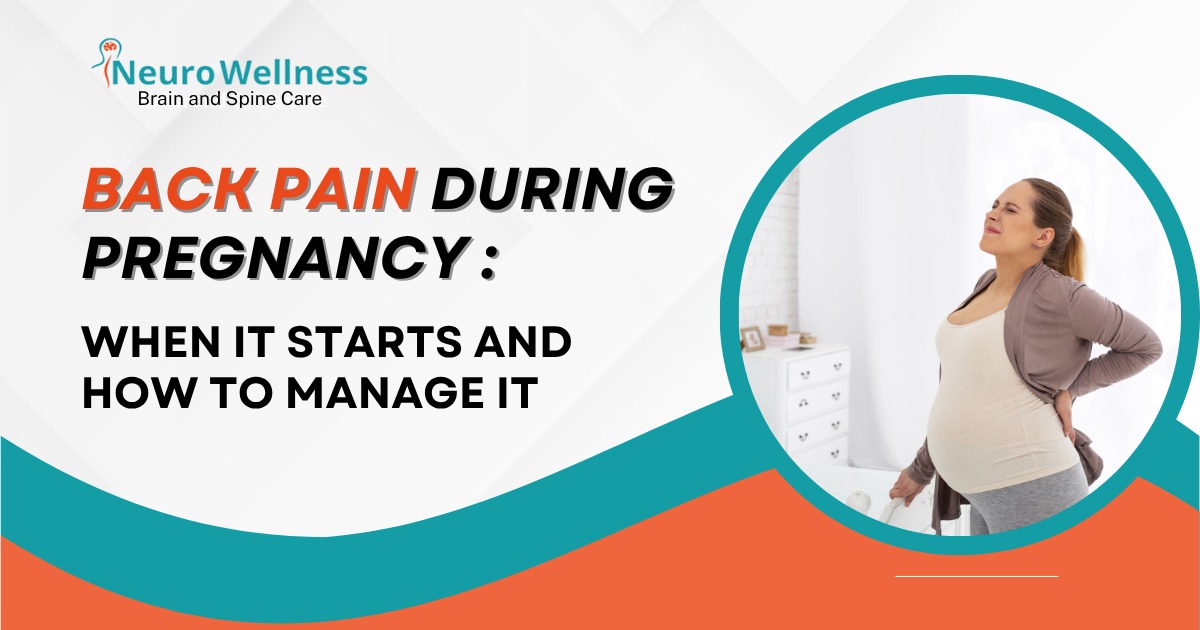Pregnancy brings profound changes to the body. As the baby grows, so does the strain on muscles, joints, and the spine. One of the most common concerns expectant mothers report is back pain.
Many women ask:
• Is this pain normal?
• When does pregnancy back pain usually start?
• Can it affect my baby?• When should I worry?
This guide explains the medical reasons behind pregnancy-related back pain and helps you understand when it is part of normal body adaptation—and when it needs attention.
• Back pain is very common during pregnancy.
• It usually begins in the second trimester.
• Hormonal changes and posture shifts are major causes.
• Most cases are not dangerous.
• Severe pain, weakness, numbness, or fever require medical evaluation.

Dr. Ganesh Veerabhadraiah
Consultant – Neurosurgeon, Neurointerventional Surgery, Spine Surgeon (Neuro)
23+ Years Experience Overall (17+ years as Neuro Specialist)
Available for Consultation: Jayanagar 9th Block & Kauvery Hospital, Electronic City
Is Back Pain Normal During Pregnancy?
Yes. Back pain is extremely common during pregnancy. Studies suggest that more than half of pregnant women experience some degree of back discomfort.
The spine undergoes significant changes due to:
• Hormonal shifts
• Weight gain
• Postural changes
• Ligament relaxation
Most back pain during pregnancy is mechanical—meaning it arises from strain rather than disease.
When Does Back Pain During Pregnancy Start?
Back pain can begin at different stages depending on individual factors.
First Trimester
Back discomfort may begin early due to hormonal changes. The hormone relaxin increases to loosen ligaments in preparation for childbirth. This can reduce spinal stability and cause mild pain.
Second Trimester
This is when most women begin to notice persistent back pain. The abdomen expands, the center of gravity shifts forward, and spinal muscles work harder to maintain balance.
Third Trimester
Pain may intensify due to:
• Increased weight
• Pelvic joint strain
• Sleep discomfort
• Muscle fatigue
Types of Back Pain During Pregnancy
Understanding the type of pain helps determine whether it is typical or concerning.
1. Lower Back Pain (Lumbar Pain)
This is the most common type and feels similar to back pain experienced outside pregnancy.
2. Pelvic Girdle Pain
Pain felt around the hips, buttocks, or pelvic joints. It may worsen when walking or climbing stairs.
3. Sciatic Pain
Occurs when the sciatic nerve becomes irritated. It causes shooting pain down one leg.
What Causes Back Pain in Pregnancy?
Hormonal Changes
Relaxin softens ligaments and joints, reducing stability in the pelvis and spine.
Weight Gain
Extra body weight increases load on spinal muscles.
Postural Adjustment
As the uterus expands, posture changes. The lower back curves more than usual, increasing strain.
Muscle Separation (Diastasis Recti)
Abdominal muscles may stretch and weaken, reducing core support.
Previous Spine Issues
Women with prior back problems may experience earlier or more intense pain.
Is Pregnancy Back Pain Dangerous?
In most cases, no.
Pregnancy-related back pain is usually muscular or mechanical.
However, certain symptoms should never be ignored.
When Is Back Pain During Pregnancy NOT Normal?
Seek medical evaluation if you experience:
Seek medical evaluation if you experience:
• Severe or sudden pain
• Pain accompanied by fever
• Numbness or tingling in legs
• Progressive weakness
• Difficulty walking
• Loss of bladder or bowel control
• Persistent one-sided pain
These may indicate nerve compression, infection, or other spinal conditions requiring medical assessment.
Severe or sudden pain
• Pain accompanied by fever
• Numbness or tingling in legs
• Progressive weakness
• Difficulty walking
• Loss of bladder or bowel control
• Persistent one-sided pain
These may indicate nerve compression, infection, or other spinal conditions requiring medical assessment.
Can Back Pain Harm the Baby?
Simple mechanical back pain does not harm the baby.
The discomfort is related to musculoskeletal changes in the mother’s body and does not directly affect fetal development.
However, severe pain limiting mobility may reduce daily activity and sleep quality, which can indirectly affect overall well-being.
How to Relieve Back Pain Safely During Pregnancy
Most pregnancy back pain improves with conservative care.
Posture Correction
Maintain upright posture. Avoid slouching.
Supportive Footwear
Wear low-heeled, supportive shoes.
Sleeping Position
Sleep on your side with a pillow between the knees.
Prenatal Exercise
Gentle exercises strengthen back and core muscles.
Pelvic Support Belts
Maternity belts may reduce strain.
Warm Compress
Mild heat therapy may relieve muscle tension.
Avoid:
• Heavy lifting
• Sudden twisting movements
• Prolonged standing
Always consult a doctor before beginning new exercise routines.
When Should You See a Specialist?
Most pregnancy back pain can be managed conservatively. However, evaluation is recommended if:
• Pain worsens progressively
• There is associated numbness or weakness
• Symptoms interfere significantly with daily life
• There is a history of spinal conditions
Timely evaluation ensures both maternal comfort and safety.
Expert Spine Evaluation in Bengaluru
For persistent or concerning symptoms, consultation with an experienced spine specialist is advisable.
Dr. Ganesh Veerabhadraiah
Dr. Ganesh Veerabhadraiah provides evaluation for spine-related conditions with an emphasis on conservative management during pregnancy whenever safely possible.
FAQs
Is lower back pain normal in early pregnancy?
Yes. Hormonal changes can cause mild discomfort even in the first trimester.
When should I worry about pregnancy back pain?
If pain is severe, associated with fever, numbness, weakness, or bladder symptoms.
Can I use painkillers during pregnancy?
Only under medical supervision. Not all medications are safe during pregnancy.
Does back pain mean labor is near?
Not necessarily. Back pain alone is not a sign of labor unless accompanied by contractions.
Can exercise worsen pregnancy back pain?
Appropriate prenatal exercise usually helps. Incorrect or intense exercise may worsen symptoms.
Will back pain go away after delivery?
Most pregnancy-related back pain improves within weeks after childbirth.
Conclusion
Back pain during pregnancy is common and usually part of normal physical adaptation. Most cases are manageable with posture correction, exercise, and supportive care.
However, persistent or severe symptoms deserve proper evaluation. Understanding the difference between normal discomfort and warning signs allows expectant mothers to stay informed and confident.
If you are uncertain whether your back pain is typical or concerning, professional evaluation can provide clarity and reassurance.




